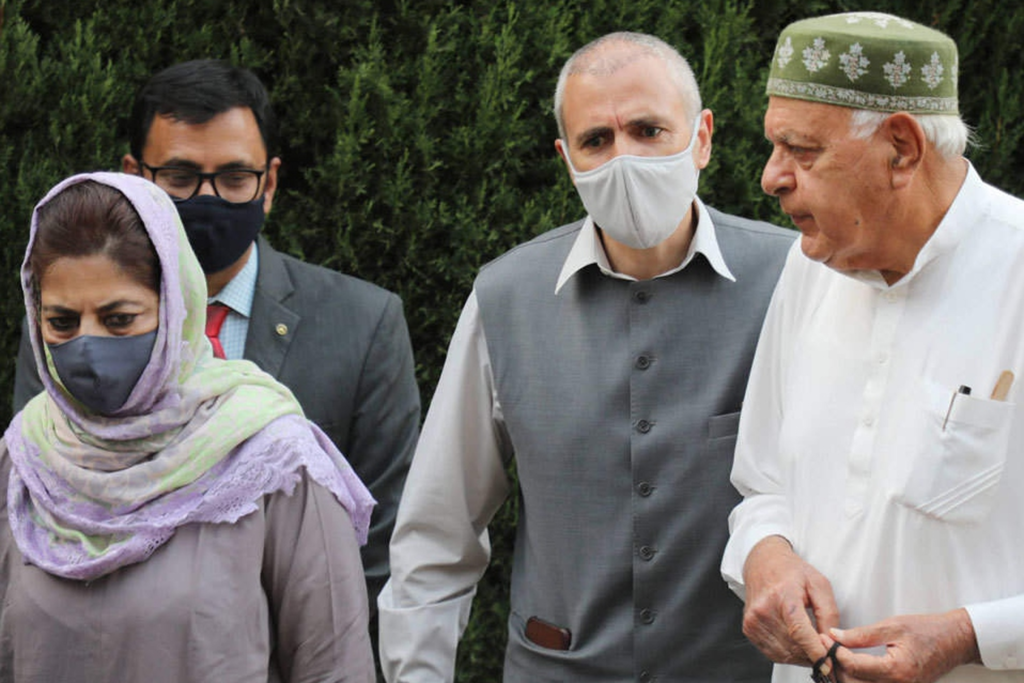
- Idreas Bhat
After the revocation of article 370 of the Indian constitution which granted special status to Indian occupied Kashmir in the union of India, Kashmir became a typical example of the classic colony in the post-colonial era. Indian government headed by a Hindu supremacist Narendra Modi also suspended the special clause of the constitution called 35A. With this step, Indians can now settle in occupied Kashmir and become its domiciles. This is aimed at changing the demography of the region from Muslim majority to Hindu majority. This makes Kashmir a case of settler colonialism same as Palestine. Article 370 was the only constitutional bridge between Kashmir and India and pro-Indian politicians in occupied Kashmir always praised Indian state for granting Kashmir special status and fooled people in the name of autonomy and self-rule. The truth is that the people of Kashmir were promised a plebiscite by the Indian state which never came to fruition. The majority of Kashmiri Muslims have rejected the so-called autonomy tunneled through Article 370. However, the pro-India parties have been the front line of defense in favor of Indian occupation.
Despite this, Indian government arrested most of these pro-India politicians in Kashmir after the revocation of Article 370 on 5th August 2019. This was a huge embarrassment for them. This proved that India does not trust any Kashmiri including their own collaborators whom they have been nurturing since decades. Initially, some statements came from NC patron Farooq Abdullah and PDP patron Mehbooba Mufti calling this move as betrayal with Kashmir. Both leaders said that “Nobody will unfurl the Indian flag in Kashmir”. However, this was a mere statement. These were the first to unfurl Indian flag in Kashmir after their release.
The pro-Indian leaders were released on the condition that they would not only focus on election campaign but will not, in any form, speak about the reading down of Article 370. Despite having fooled people for 72 years in the name of Article 370, they accepted the deal and buried their own political narrative. Anyone who accepted the deal was released. On the other side, Indian government started a brutal crackdown on resistance organizations and leadership. Jamat e Islami Jammu & Kashmir (JIJK) and Jammu and Kashmir Liberation Front (JKLF) were banned a few months before 5th August 2019. Most resistance leaders were imprisoned in different jails across the state and some were sent to Indian jails outside the region. One member of JK named Ghulam Muhammad Bhat (65) died in a UP Jail. Another top leader of Kashmir, chairman Tehreek-e-Hurriyat Jammu and Kashmir Muhammad Ashraf Sehrai was martyred in a Jammu jail. Muhammad Altaf Fantosh also died in Delhis Tihar Jail after being denied medical aid for several months. Resistance leaders like Shabir Ahmad Shah, Asiya Andrabi, Fahmeda Sofi, Nahida Nasreen, Fahim Ramzan, Moin ul Islam, and many others were meted out with brutal treatment inside different Indian jails. Since the state cannot erase sentiment from people’s hearts and cannot de-Islamize Kashmir immediately, it needs to manage the resistance narrative and religion (Islam) as per its convenience. For this, the state needs to engage with the resistance leadership apart from their own historic collaborators. The occupying Indian state started its engagement with resistance and religious leadership after it was done with the pro-Indian political leadership.
Since Mirwaiz Umar Farooq was kept under house detention, he was engaged by the Indian state on different occasions during this time period. He was finally released in September 2023 and led Friday prayers at the historic Jamia Masjid in Srinagar. Whether Mirwaiz has accepted some conditions from the Indian state, only time will tell. Mirwaiz made many things clear in his first Friday sermon after his release like appealing Kashmiri Pandits to return, and requesting people to be peaceful and patient. There was no mention of the Indian state’s brutal crimes against the people of Kashmir nor was any tribute paid to the martyrs of last four years. Although he has started his public appearances by attending marriage ceremonies and fatiha khwani, he did not bother to attend funeral prayers in absentia for martyrs including top leaders like Syed Ali Geelani and Muhammad Ashaf Sehrai. Mirwaiz is yet to visit the families of Geelani and Sehrai for condolences as they were his companions in the joint resistance leadership (JRL). As | am writing this, he has been put under house arrest again!
Other leaders who were released include a prominent religious cleric from the Ahle Hadith sect Mr. Mushtaq Ahmad Veeri. Other prominent religious clerics who were released on similar conditions include Abdul Rashid Dawoodi from the Barelvi sect. Days after his release, Ravinder Raina, a hardcore member of RSS and BJP politician from Jammu division visited Dawoodi’s residence and was welcomed with garlands by Dawoodi’s people. An alleged member of JIJK who was expelled in 2014 recently joined the BJP’s Apni Party led by Altaf Bukhari. As per sources, it is said that a top scholar of a particular religious organization held a meeting with the Indian national security advisor (NSA) Mr. Ajit Kumar Doval at the end of year 2022.
After a high-profile meeting of some self-styled leaders of some religious organizations with India’s NSA, the state crackdown on JIJK was intensified. Properties of JUK worth one billion Indian rupees were sealed and confiscated, many FAT schools run by JUJK were directed to appoint one employee on state recommendation (to spy on school activities), JIJK Bait ul Maals were seized and members of the core committee were subjected to brutal treatment inside jails. JKLF chairman Muhammad Yasin Malik was also meted with inhuman treatment and faces death penalty ina bogus case. Like other leaders and organizations, the Indian state approached almost every resistance leader for a deal in exchange for release. However, many resistance and religious leaders outrightly rejected any kind of compromise. The rejection of a compromise from these prominent leaders was a blow to the Indian state’s normalization project. Therefore, the state adopted an alternative approach. As per the sources, the intelligence bureau (IB) of India approached some other less prominent and non-imprisoned leaders of JUK. A deal was offered to them which include contesting elections under Indian constitution, merger with Jamaat e Islami Hind, a change in the JUK constitution to drop Kashmir’s disputed status, and restricting their activities to religious and social issues.
It is pertinent to mention that without the approval of the core committee and chairman, nobody has the mandate to enter into any sort of engagement with any state organ. This goes against the tenets of sharia on which Jamaat’s shura is based and also against Jamaat’s constitution. If the incarcerated senior leadership of JIJK has rejected a deal, the rest of the fellas cannot act on their own. Moreover, at the start of armed resistance in the 1990s, JIJK was declared as the mother organization of resistance in a meeting held by many resistance originations at Sopore. Jamaat has offered immense sacrifices and stood firm on the path of truth and resistance. Jamaat members were slaughtered in every nook and corner of the valley. Now any kind of compromise will be tantamount to selling the graves of those martyrs. Any kind of compromise will be tantamount to stabbing the movement of Iqamat-e-Deen in the back. Furthermore, Jamaat does not belong to any individual or a group of few individuals like Magrays, Parray’s, Lone’s and Wanis. It belongs to the martyrs of Kashmir and the flag bearers of resistance. A Jamaat that erases Azadi from its constitution is as irrelevant as NC and PDP. We are hopeful that JNK will sustain the pressure and show perseverance, firm commitment, and bravery in these challenging times.



